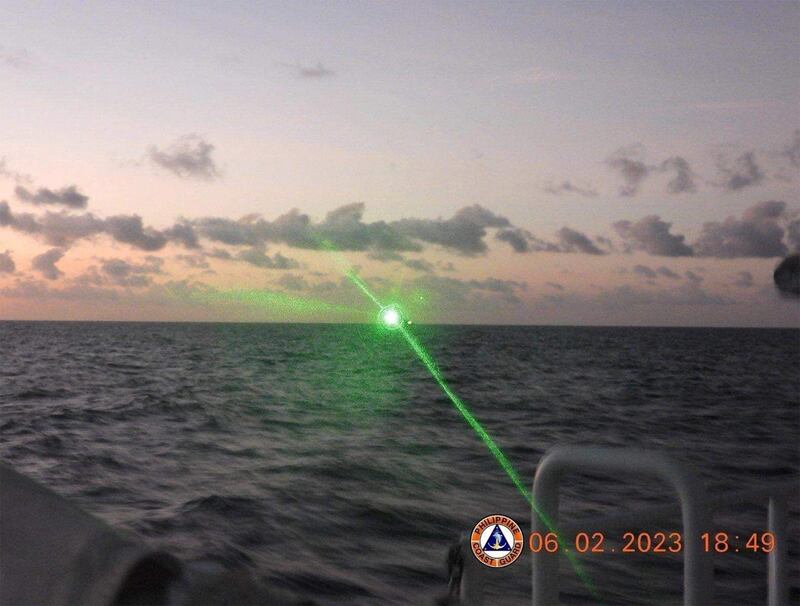UPDATED AT 2:49 a.m. ET ON 02-14-2023
The U.S. has expressed support for the Philippines over the laser incident in the South China Sea, condemning China’s “provocative and unsafe” conduct.
The Philippine Department of Foreign Affairs on Tuesday also lodged a diplomatic protest with the Chinese Embassy in Manila.
On Monday, the Philippine Coast Guard (PCG) accused China of performing dangerous maneuvers and pointing a laser at one of its vessels, the BRP Malapascua, causing temporary blindness to the crew.
The incident took place on Feb. 6 near the Second Thomas Shoal in the Spratlys, when the Philippine vessel was attempting to deliver food and supplies to the troops stationed there.
Beijing rejected the accusation, saying the Philippine ship “intruded into the waters” off the Spratly islands “without Chinese permission” and the Chinese Coast Guard (CCG) “acted in a professional and restrained way.”
China claims sovereignty over most of the South China Sea, including the two main archipelagos of Paracels and Spratlys that it calls Xisha and Nansha, respectively.
A U.N. tribunal in a legal case brought by the Philippines in 2016 ruled that the Chinese claims in the South China Sea were baseless and illegal but Beijing has so far refused to acknowledge the ruling.
‘Stand with our allies’
A U.S. State Department statement on Monday said that "the United States stands with our Philippine allies in the face of the People's Republic of China (PRC) Coast Guard's reported use of laser devices against the crew" of the Malapascua.
“The PRC’s conduct was provocative and unsafe, resulting in the temporary blindness of the crewmembers of the BRP Malapascua and interfering with the Philippines’ lawful operations in and around Second Thomas Shoal,” it said.
The statement by spokesperson Ned Price reaffirmed that an armed attack on Philippine armed forces, including the Coast Guard in the South China Sea, would invoke U.S. mutual defense commitments under the 1951 U.S.-Philippines Mutual Defense Treaty.

Meanwhile, the Philippine Foreign Ministry said it had filed a diplomatic protest over the laser incident to the Chinese Embassy in Manila on Tuesday.
The diplomatic protest “condemned the shadowing, harassment, dangerous maneuvers, directing of military-grade laser, and illegal radio challenges by CCG vessel 5205 against PCG vessel BRP Malapascua.”
Spokesperson Teresita Daza said those “acts of aggression” happened just after the visit by the Philippine President Ferdinand R. Marcos Jr. to China, “during which he and Chinese President Xi Jinping agreed to manage maritime differences through diplomacy and dialogue, without resorting to force and intimidation.”
Daza called on Beijing “to comply with its obligations under international law” and direct its vessels to stop aggressive activities against Philippine vessels.
Invoking the Mutual Defense Treaty
Retired Supreme Court Justice Antonio Carpio, who is among the leading nationalist voices against the perceived Chinese aggression here, noted that Beijing's new coast guard law has authorized whatever force in its arsenal to enforce its claims in the sea region.
That in itself is a violation of the United Nations charter, which expressly outlaws force to settle disputes between and among states, he stressed.
"Now, China's coast guard vessels are using military grade lasers to enforce China's nine-dash line claim. The use of lasers that causes permanent blindness is a prohibited weapon under the 1998 Protocol on Blinding Laser Weapons to which China and the Philippines are parties," he said in a statement.
"Laser weapons can either cause permanent or temporary blindness. If it causes permanent blindness, the laser weapon is outlawed and cannot be used as a weapon by militaries. If it causes only temporary blindness, it can be used as a weapon by militaries," Carpio said.
Thus lasers can be considered an armed attack under the Philippine-Mutual Defense Treaty, he stressed although he added that before Manila invokes the MDT "the Philippines should first coordinate with the US [regarding] a joint statement that future use by Chinese coast guard vessels of laser weapons on Philippine public vessels or aircraft will trigger the operation of the MDT."
On Feb. 21-Feb. 23 China and the ASEAN group of Southeast Asian nations are scheduled to hold a meeting to review the implementation of the so-called Declaration of the Conduct of Parties (DOC) in the South China Sea.
The DOC is a risk control agreement signed in 2002 by Beijing and ASEAN countries to prevent conflicts in the disputed waters.
It is unclear whether the laser incident will be discussed at the meeting.
Story has been updated to include comments from retired Supreme Court Justice Antonio Carpio.
Camille Elemia in Manila contributed to this report.
BenarNews is an RFA-affiliated news organization.
